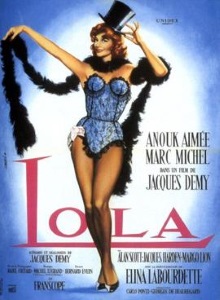
Considering how much I adore both The Umbrellas of Cherbourg and The Young Girls of Rochefort, I suppose it’s only a matter of time until I got to this, director Jacques Demy’s first feature length film. The preamble states that it was restored as the original negative had been destroyed and the person in charge of that was Agnès Varda. We’d just seen Varda of course in Faces, Places but somehow I never realized that they were husband and wife.
Roland Cassard is an aimless young man in Nantes who finds life and work meaningless, dreaming instead of some escape that he is unable to properly articulate. Meanwhile Lola is a dancer in a local cabaret who with the other girls there frequently entertain American sailors on leave in the city. One sailor in particular, Frankie, is especially taken with her and comes to visit her often. Coincidentally Roland and Lola, whose real name is Cécile were classmates at school though they have not seen each other since before the war. While going to follow up a lead on a job, they happen to run into each other and agree to meet for dinner. The date rekindles Roland’s old love for her but she only pines after Michel, her first love who left her with a child years ago. Another character is a younger girl also named Cécile who Roland meets at a book shop and later also becomes friends with Frankie.
Unlike the two other more well known films, Lola is not a musical even if it does have some music and a scene of Lola herself singing. All the same it is recognisably a work by the same director with the romantic themes and the high level of kinetic energy present here. Indeed as my wife notes, the contrast with artistic Chinese films could not be more stark as those tend to be slow and have little dialogue. Here the characters are constantly on the move going from one place to another while talking at a fast pace. Accompanying this are emotions that turn this way and that so rapidly as to give you whiplash. Roland switches quickly from being despondent and eager to get away from Nantes to being convinced that he has found the love of his life in the city and wishing to make a home there to feeling betrayed by her. The same goes for the other characters. This is a film of high strung emotions and drama set amidst the streets of the small city of Nantes.
With its lack of music and color, it is immediately less attractive than the other films while the split focus on multiple characters makes it harder to work out what the underlying theme is. Then I recalled reading earlier about how it’s about characters who are searching for someone and constantly just missing them and that makes a lot of sense. This is easily the film that feels the most like a work of the French New Wave though it still isn’t as sophisticated as the true greats. Personally I confess to being a bit confused by what it says about romance. Lola’s own story seems like an affirmation of true love yet Roland’s arc is not, especially when you consider that he is the same character that shows up in The Umbrellas of Cherbourg. Perhaps it is saying something about the passions of youth as the story of the younger Cécile indicates? I suppose I will eventually have to watch the final film of the series Model Shop one day to find out the eventual fate of the character of Lola to know for sure.
Overall I found this to be interesting and enjoyable, especially for its portrayal of Nantes. One thing I really like about Demy’s films is that they give a chance for France’s lesser known cities to shine. But I have to say that I like it quite a bit less as it simply isn’t as fun or moving while not being quite deep enough to make up for it.
One thought on “Lola (1961)”